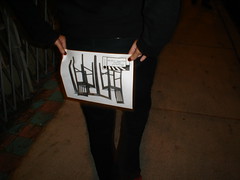Most writers, of course, learned to write in school—the teacher stuck a pencil in their hand and showed them how to form the letters. Another teacher later on taught them about words and sentences and parts of speech and punctuation.
 Of course, everyone learns those things, and not everyone goes on to want to be a writer. Personally, I learned a lot from writing—a lot. I wrote all through high school. I wrote in my freshman year of college, and then I drifted away from writing for several years while I finished school, got married, and started my family, though somewhere in the back of my mind, I still wanted to be a writer.
Of course, everyone learns those things, and not everyone goes on to want to be a writer. Personally, I learned a lot from writing—a lot. I wrote all through high school. I wrote in my freshman year of college, and then I drifted away from writing for several years while I finished school, got married, and started my family, though somewhere in the back of my mind, I still wanted to be a writer.
And of course, I’ve learned a lot in other ways as well. Writer’s conferences are a lot of fun and extremely useful, but most of the time aren’t designed to hit the techniques very hard (unless you go to a more one-on-one track). Critiques from trusted friends (and strangers!) have been invaluable.
And then there are the books, of course. I hit the public library and read almost every writing technique book they had, my favorites being How to Write a Damn Good Novel and How to Write a Damn Good Novel, II by James N. Frey, and Writing the Breakout Novel by Donald Maass, among others that escape me now.
But honestly, even these things are kind of advanced—they don’t, for example, cover basic things like showing vs. telling. And, um, I’ve kind of forgotten how I learned that.
So how did you learn writing—the basics and the advanced stuff?
Photo by Schmorgie13





 looking at my own work.
looking at my own work. Of course, everyone learns those things, and not everyone goes on to want to be a writer. Personally, I learned a lot from writing—a lot. I wrote all through high school. I wrote in my freshman year of college, and then I drifted away from writing for several years while I finished school, got married, and started my family, though somewhere in the back of my mind, I still wanted to be a writer.
Of course, everyone learns those things, and not everyone goes on to want to be a writer. Personally, I learned a lot from writing—a lot. I wrote all through high school. I wrote in my freshman year of college, and then I drifted away from writing for several years while I finished school, got married, and started my family, though somewhere in the back of my mind, I still wanted to be a writer.